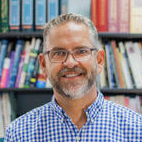by Chuck DeGroat
To everything there is a season says the writer of Ecclesiastes. For control freaks like me, the wisdom writer is a fly in the ointment. There is a perennial pattern, a dying-and-rising pattern which mirrors the seasons, which mirrors life itself, which provides perspective when we feel out-of-control.
Our attempts to gain control are often motivated by an ego that thinks it can stop the pattern. With enough effort, we can avoid disappointment or failure, protect ourselves, shift the tide in a new direction. But the tide has a funny way of falling back into its predictable rhythm. Flustered by our futile efforts, we can become disillusioned, even despairing.
I teach pastors to attend to this pattern. I teach people to attend to this pattern. I teach couples to attend to this pattern in marriages. In fact, in marriage retreats I teach a first session “on the death of your marriage.” I like this line from a David Wilcox song “Start with the Ending.” He writes:
Secret of a happy marriage
Maybe you should write this down
You wanna keep a love together
The best way is to end it now
End it now. Embrace the inevitability of mutual disappointment. Name the patterns of self-sabotage. Learn to do the dying.
The problem is that our egos resist. Parts of us bent on control simply cannot imagine a world in which we do not have ultimate autonomy. Genesis 3 is lodged deep in our beings.
My personal pattern is to greet disappointment with my full energies of my brain’s limbic system – fight, flight, or freeze. I generally spiral chaotically through all three of them. Anyone privy to the debris field of my messy survival patterns wonders how this ordinarily relaxed soul can, on a dime, become enraged, shut down, or go completely away. Parts of me jostle for internal control in order to contain my feelings of shame and my sense of being a failure.
![]() Perhaps this is why I am so drawn to women and men whose imaginations are not hijacked by despair amidst disappointment, courageous souls like St. Teresa of Avila who led a reform movement in patriarchal 16th century Spain. Nelson Mandela, who allowed prison to shape his character, not destroy it, for the sake of a nation’s freedom from apartheid. Etty Hillesum, who prayed and journaled contemplatively and who intervened boldly for others on her way to the gas chambers. Martin Luther King, Jr., whose imagination seemed undaunted by the seemingly hopeless present. Jesus, who journeyed to the cross in order to rise for the redemption of all.
Perhaps this is why I am so drawn to women and men whose imaginations are not hijacked by despair amidst disappointment, courageous souls like St. Teresa of Avila who led a reform movement in patriarchal 16th century Spain. Nelson Mandela, who allowed prison to shape his character, not destroy it, for the sake of a nation’s freedom from apartheid. Etty Hillesum, who prayed and journaled contemplatively and who intervened boldly for others on her way to the gas chambers. Martin Luther King, Jr., whose imagination seemed undaunted by the seemingly hopeless present. Jesus, who journeyed to the cross in order to rise for the redemption of all.
We know now that the folks I just mentioned were on to something neurobiologically. An imagination for a new future is the antidote to our self-sabotaging neural pathways. An imagination that sees the dawn emerging from the dark allows us to live as if our longed-for future is happening now. Visionaries and seers, contemplatives and mystics, true seekers of justice – all have this remarkable capacity to see in ways that I cannot see when I’m hijacked by my traumatized limbic system. They are able to imagine spring-time within the heart of winter.
The pattern is inevitable. There will be disappointment, failure, disillusionment, shame, pain, brokenness. There is no perfect relationship, no ideal organization, no perfectly just society. We need a Kingdom imagination. We need a larger Story to shape our wobbly and wavering smaller stories.
Who among us will tell this Story?
Chuck DeGroat teaches pastoral care and counseling at Western Theological Seminary in Holland, Michigan.

